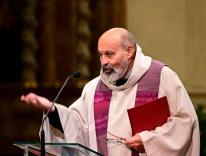In reflecting upon the witness of Sister Teresa Benedicta of the Cross (Edith Stein) whose feast the Church celebrates today, I came upon a provocative and illuminating article by the Jewish theologian, David Novak. Writing in 1999, Novak said in part:
Supersessionism is the subject of deep theological debate today. Many Jews have seen it as the core of Christian anti-Judaism. Many Christians are embarrassed by it, seeing it as part of the anti-Judaism that was so easily appropriated by modern anti-Semitism. Yet, Christian supersessionism need not denigrate Judaism. It can look to the Jewish origins of Christianity happily and still learn of those origins from living Jews, whom Pope John Paul II likes to call "elder brothers." Christian supersessionism can still affirm that God has not annulled his everlasting covenant with the Jewish people, neither past nor present nor future. Jews can expect no more than that from Christians, and Christians probably cannot concede any more to Judaism. For if Christianity does not regard itself as going beyond Judaism, why should Christians not become Jews? And, conversely, any Jew who believes Christianity supersedes Judaism can only in good faith become a Christian—as Edith Stein did.
Fruitful conversations of late between Jews and Christians have largely bracketed this critical issue for good reasons. It is, nevertheless, the crucial question that leaves the two communities at an impasse. All attempts to get beyond it—be they political, exegetical, or philosophical—have been failures. After all, it is the question of truth, and truth is what we are both all about. To bracket this question is quite different from either suppressing it altogether or reducing all discussion to it.
Edith Stein represents our impasse. She cannot be a bridge between Jews and Catholics because in this world one cannot be simultaneously both a faithful Jew and a faithful Catholic. Since the Jewish and Catholic communities are mutually exclusive, and both Jews and Catholics derive their identities from God’s covenant with their communities, no member of one community can also be a member in good standing of the other. Moreover, one cannot expect the approval of the covenanted community one has left. As with Abraham our father, the answer to God’s call always involves leaving some earlier household in one way or another, and that household does not and cannot provide one with a warm farewell.
One should be able to access the full article here.


